Dog dental health is an often overlooked but crucial aspect of pet care. Good dental hygiene can significantly improve a dog’s quality of life, preventing pain and serious health issues. Regular brushing, professional cleanings, and dental treats are essential practices that help maintain your dog's oral health.
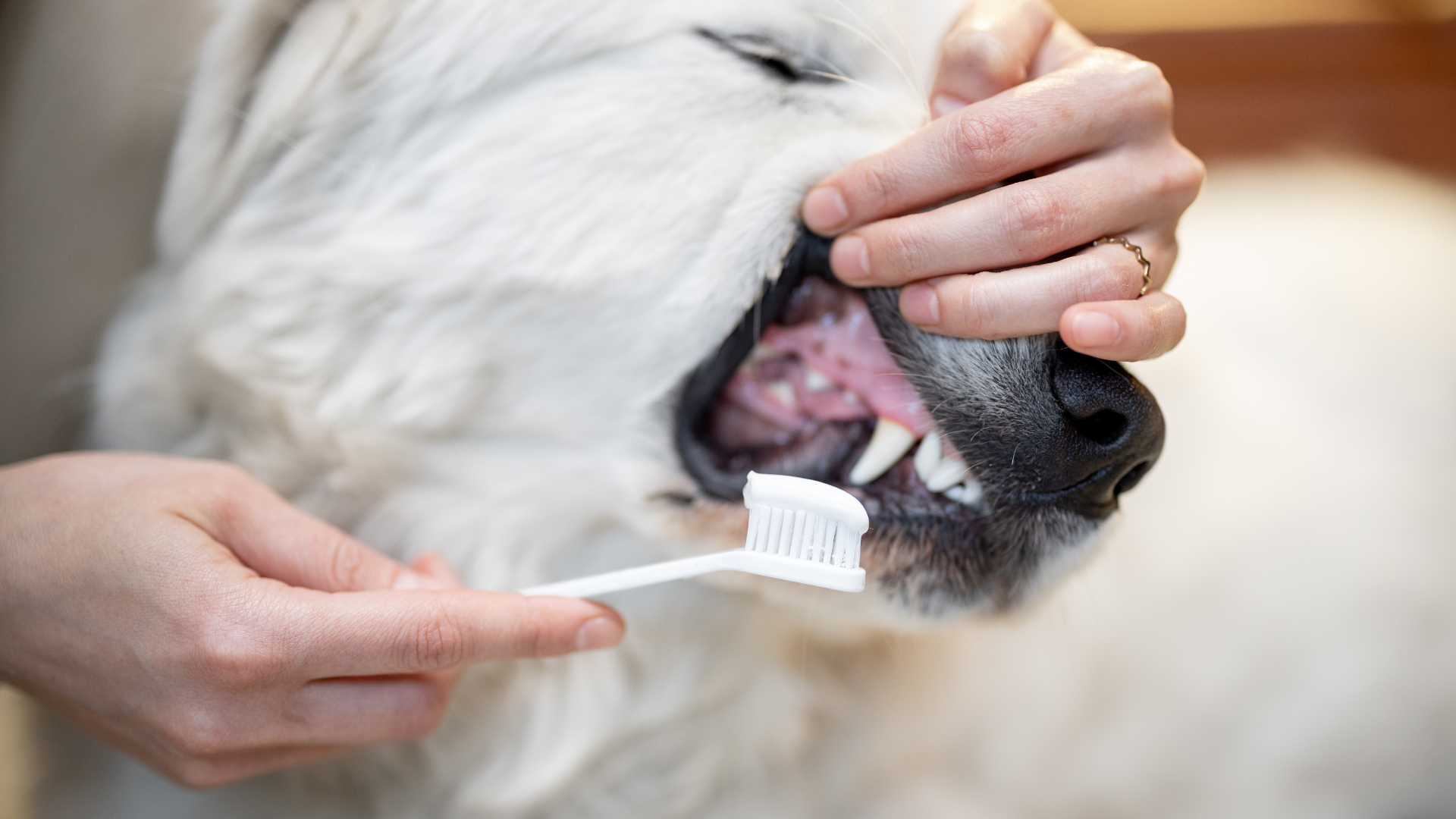
Understanding the importance of proper dental care for dogs can lead to longer, healthier lives for our furry friends. Neglecting dental hygiene may result in plaque buildup, gum disease, and even tooth loss, which can affect a dog's overall well-being. Additionally, bad bacteria from neglected teeth can spread, potentially leading to heart, liver, and kidney issues.
There are several methods to keep a dog's teeth in great condition. Brushing your dog's teeth daily with canine toothpaste, using dental wipes, and incorporating dental-friendly treats can all contribute to a healthy mouth. Regular veterinary checkups are also necessary to catch early signs of dental problems and to perform professional cleanings as recommended. Readers will find it essential to integrate these practices into their pet care routine to ensure their dog's ongoing dental health.
Understanding Dog Dental Health
Maintaining a dog's dental health is essential for their overall well-being. This section covers why oral hygiene matters and the common dental issues dogs face.
The Significance of Oral Hygiene
Oral hygiene in dogs is crucial for preventing various health complications. Without regular care, plaque builds up on teeth, leading to tartar. Tartar can cause periodontal disease, which affects the gums and can lead to tooth loss and pain. Chronic oral diseases can even impact organs such as the heart and kidneys.
Regular brushing and professional dental cleanings are vital. They help remove plaque before it hardens into tartar. Pet owners should use dog-specific toothpaste and brushes for the best results. Monitoring the dog's mouth for signs like bad breath (halitosis), red or swollen gums, and difficulty eating can help catch issues early.
Common Dental Issues in Dogs
Dogs commonly suffer from a range of dental problems. One of the most prevalent is periodontal disease, which involves inflammation and infection of the structures around the teeth. This condition begins with gingivitis, where the gums become red and swollen due to plaque bacteria. If left untreated, it progresses to more severe stages, forming periodontal pockets that harbor bacteria.
Gum disease can lead to severe pain and tooth loss. Dogs with advanced periodontal disease can experience systemic health problems, as bacteria enter the bloodstream and affect the heart and kidneys. Regular veterinary check-ups are essential for early detection and treatment. Common signs of dental issues include bad breath, drooling, and difficulty eating or chewing.
For an in-depth resource on monitoring your dog's dental health, refer to Understanding Your Dog's Dental Chart.
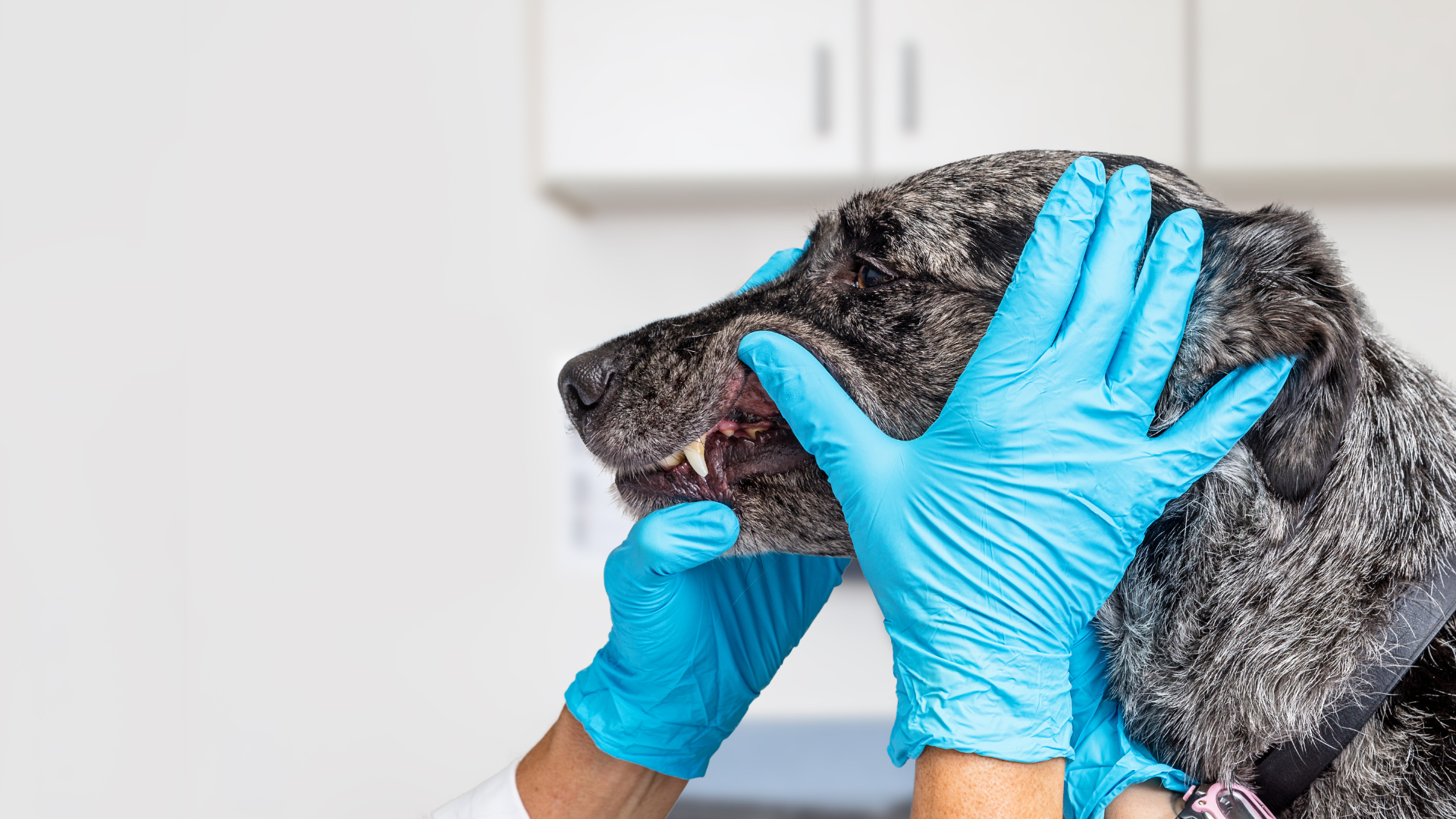
Daily Dental Care Techniques
Routine dental care is essential for maintaining your dog's oral health. Effective methods include regular brushing and the use of various dental care products designed to prevent dental issues like plaque buildup and gum disease.
The Basics of Brushing
Brushing is the cornerstone of dog dental care. Brushing should ideally be done daily to effectively remove plaque and prevent dental issues. Use a dog-specific toothpaste as human toothpaste can be harmful to dogs. A soft-bristled toothbrush or a finger brush can be used, providing better control and reducing the risk of gum damage.
Focus on the outer surfaces of the teeth, especially along the gum line, where plaque tends to accumulate. Even a few strokes per session can help, so aim for consistent brushing rather than perfection. Training your dog to accept brushing by starting slowly and offering rewards can make the process smoother and more enjoyable for both of you.
Alternative Dental Care Products
While brushing is vital, there are other products that can support your dog's dental hygiene. Dental chews and treats are designed to help remove plaque and tartar as your dog chews. These treats often contain ingredients that promote oral health. Chew toys can also be beneficial by mechanically cleaning the teeth through chewing action.
Dental wipes provide a simpler, less messy alternative to brushing. Wrap the wipe around your finger and gently swipe your dog's teeth, focusing on hard-to-reach areas. Water additives can be a convenient option too, as they freshen breath and help reduce plaque buildup when added to your dog's drinking water. Regular use of these products, along with brushing, can significantly improve your dog's dental health.
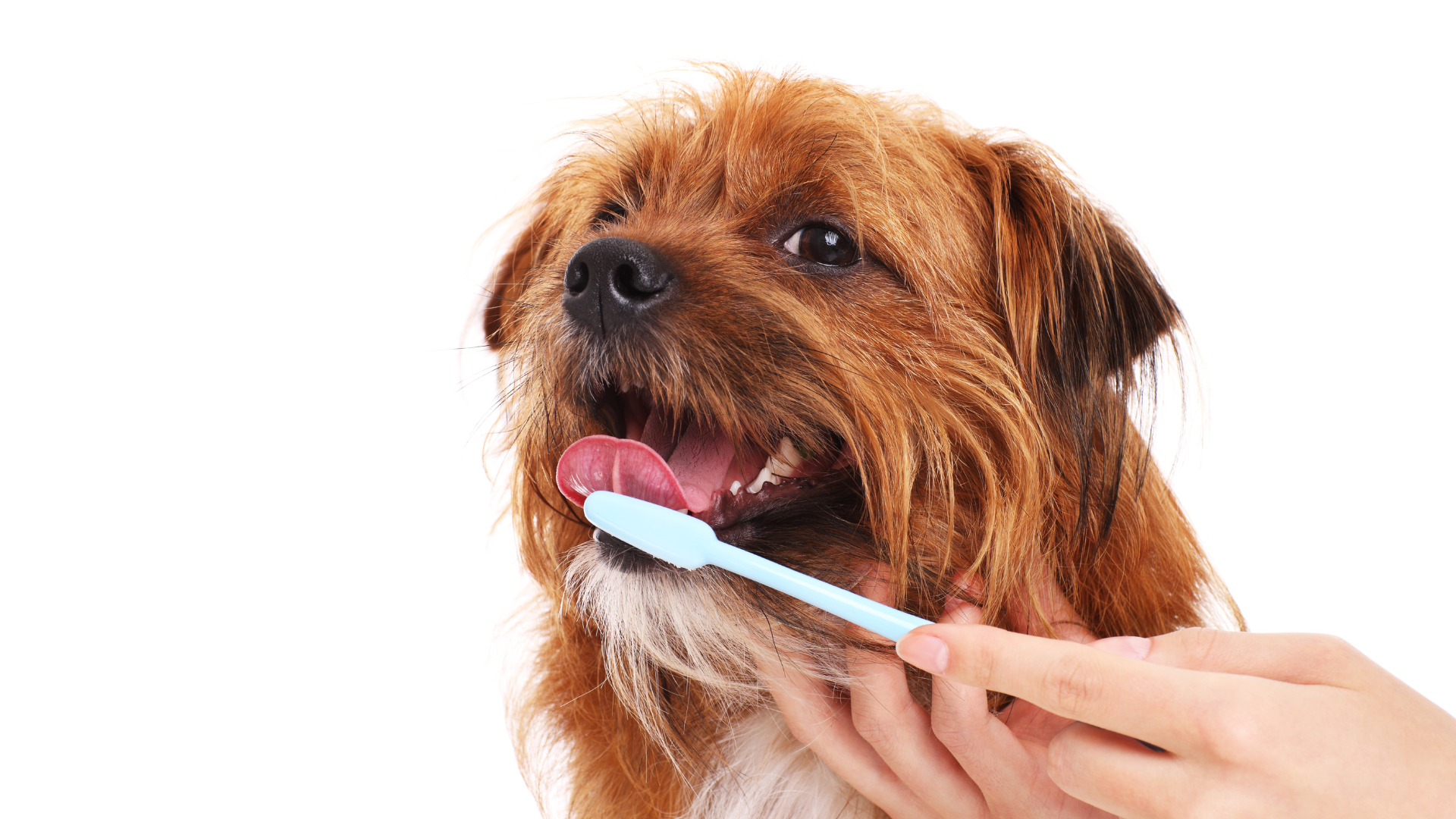
Professional Dental Care for Your Dog
Professional dental care is essential for maintaining your dog's oral health. Key areas include regular cleanings, understanding various dental procedures, and selecting high-quality dental services.
The Role of Professional Cleanings
Professional dental cleanings are crucial to prevent and treat dental diseases in dogs. These cleanings typically involve the use of anesthesia to ensure your pet’s comfort and the thoroughness of the procedure.
Steps in Professional Dental Cleaning:
- Oral Examination: Veterinarians perform an initial oral exam to assess the dog's dental health.
- Scaling and Polishing: Tools are used to remove plaque and tartar build-up both above and below the gum line.
- Dental X-rays: These are sometimes necessary to detect problems not visible during the oral exam.
The American Kennel Club emphasizes the importance of regular professional cleanings every 12-24 months, depending on the dog's specific needs and veterinarian recommendations.
Understanding Dental Procedures
Several dental procedures may be part of your dog's professional dental care routine. These could include tooth extractions, fillings, and treatments for periodontal disease.
Common Dental Procedures:
- Tooth Extractions: Necessary when teeth are severely decayed or infected.
- Dental X-rays: Helps in diagnosing root problems, fractures, or bone loss.
- Periodontal Treatment: Tackles gum disease which can lead to tooth loss if untreated.
Anesthesia is typically required for these procedures to keep the dog still and pain-free. VOHC (Veterinary Oral Health Council) guidelines help ensure treatments meet veterinary standards.
Selecting Quality Dental Services
Choosing the right veterinary service for your dog’s dental needs is vital. Look for facilities that offer comprehensive services, from routine cleanings to advanced dental surgeries.
Factors to Consider:
- Veterinary Expertise: Ensure the vet is experienced in canine dental care.
- Equipment: Modern dental tools and facilities, including dental x-rays, are essential for quality care.
- Accreditation: Check for VOHC approval and other relevant certifications.
Considering pet insurance can also help manage the costs of professional dental care. The investment in professional cleanings and treatments can lead to a healthier, happier life for your dog.
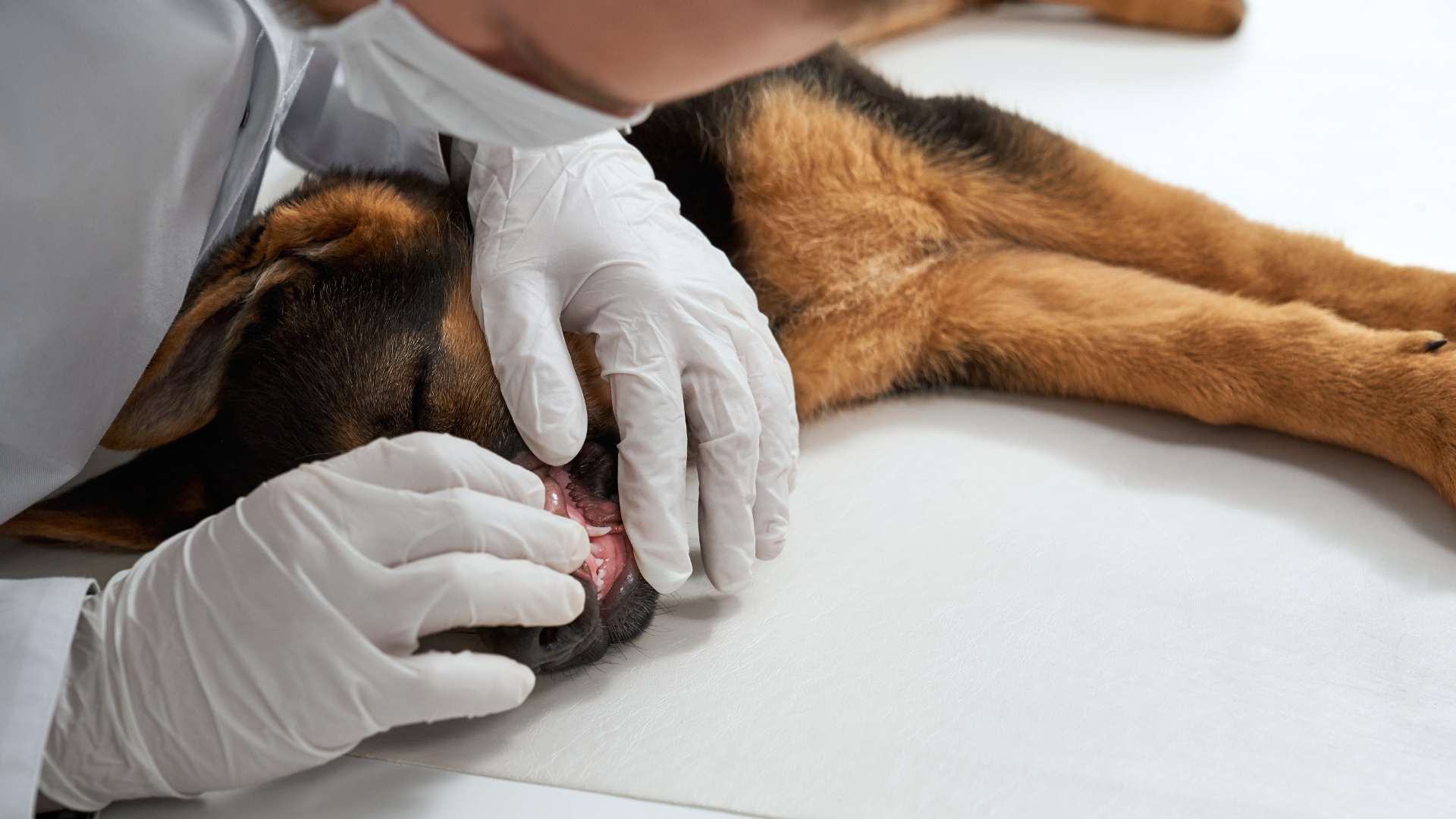
Nutrition and Dental Health Connections
Proper diet plays an essential role in maintaining your dog's dental health. The right nutrition can prevent plaque buildup and tartar, reducing the risk of periodontal disease.
Evaluating Diet's Impact on Dental Well-being
Nutrition affects a dog's dental health in several ways. Foods with the right texture can help clean teeth, reducing plaque and tartar. Dry kibble, for example, can be beneficial as it scrapes the teeth while chewing, which helps in maintaining a clean and healthy dog mouth.
Plaque is a sticky film of bacteria that forms on teeth. It can harden into tartar if not removed. Diets that promote chewing can help manage plaque. Dogs that struggle with difficulty chewing or who experience dental discomfort may benefit from wet foods but should still be monitored for plaque buildup.
High-quality diets are crucial. Nutrient-rich foods support overall health and aid in preventing the conditions that contribute to plaque and tartar. Foods with antioxidants and omega-3 fatty acids can aid in reducing inflammation and supporting immune function.
Chewing is an integral part of dental health. It helps stimulate saliva, which acts as a natural cleanser. Providing safe chew toys and dental treats can supplement a nutritious diet to further promote oral hygiene.
In summary, selecting the right food and ensuring it has the right texture and nutrients is vital for maintaining a healthy dog mouth free of plaque and tartar.
Recognizing and Addressing Dental Diseases
Recognizing dental diseases early can prevent severe health issues in dogs. Addressing these problems involves identifying initial symptoms and implementing effective treatments and preventative measures.
Early Signs of Dental Trouble
Early signs of dental trouble in dogs include symptoms such as bad breath, plaque, and tartar buildup. Owners may also notice inflamed gums and difficulty eating. These signs indicate potential tooth decay and gum inflammation. Excessive drooling and behavioral changes like avoiding food or chewing on one side of the mouth are common. Regular check-ups are critical for early detection. Ignoring these signs can lead to chronic inflammation, which may affect organs like the heart and kidneys.
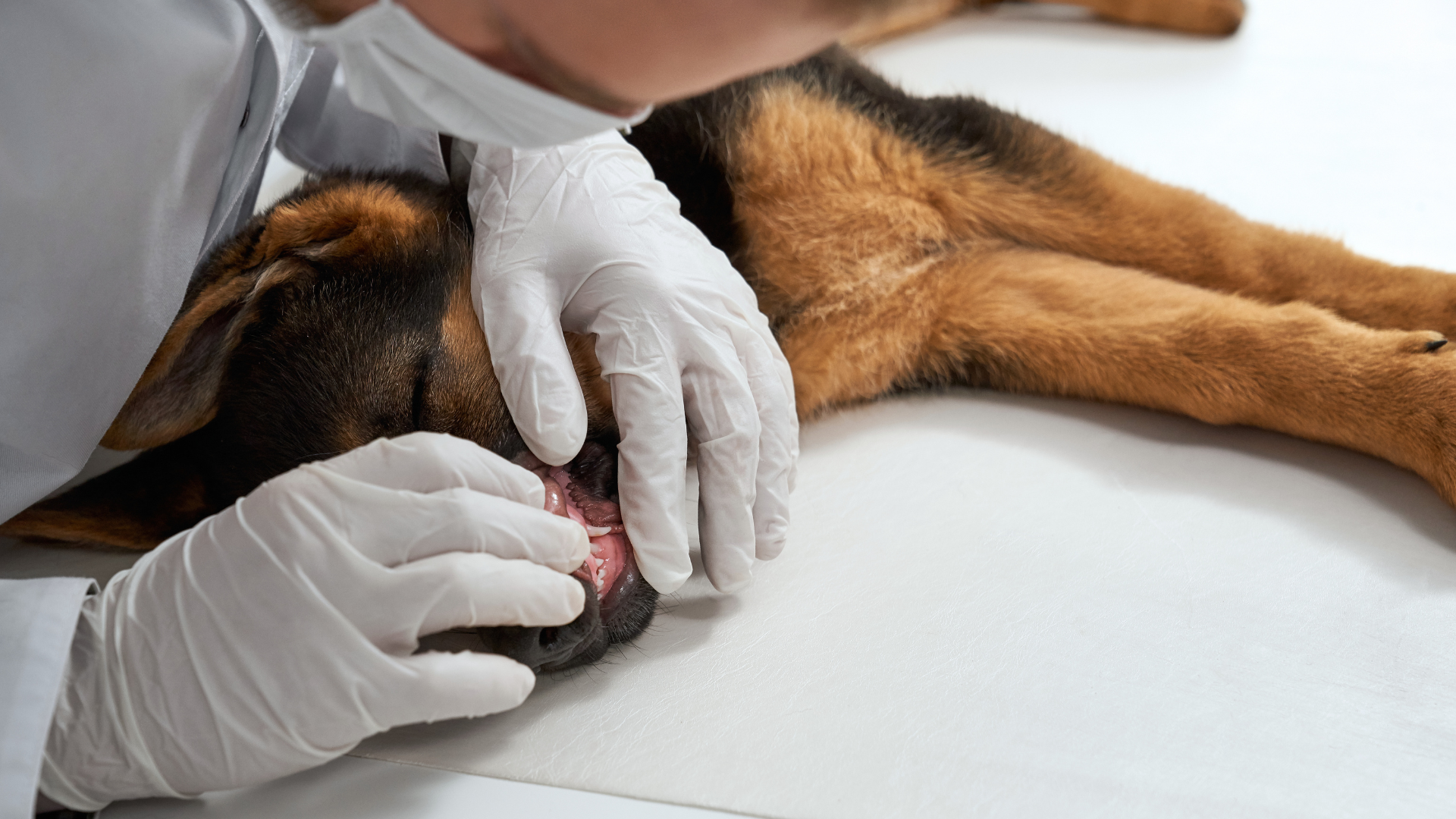
Treatment and Prevention Strategies
Effective oral hygiene is key to preventing and treating dental diseases. A consistent brushing routine can reduce plaque and tartar buildup. Veterinary dental cleanings are essential to address severe tartar buildup and inflamed gums. Special diets and chew toys can help maintain cleaner teeth. For advanced cases, professional treatments like periodontal therapy and tooth extractions may be necessary. Preventative care can significantly decrease the risk of tooth loss and associated health issues.
For more in-depth information on recognizing signs of dental diseases, you can refer to Recognizing Dog Dental Disease and When to Contact a Vet. For more on treatment and prevention strategies, Your Guide to Dog Dental Health: 7 Questions Answered offers valuable insights.
Product Safety and Recommendations
Ensuring the safety and effectiveness of dental products for dogs is crucial for maintaining their oral health. This section provides a guide to selecting the right products that will help prevent dental disease and promote a healthy mouth for your pet.
Choosing the Right Products for Dental Care
When selecting dental care products for dogs, it's important to choose items specifically designed for canine use. Human toothpaste contains harmful substances, such as xylitol, which can be toxic to dogs. Instead, use dog-specific toothpaste that is safe if swallowed and appealing in flavor.
Chew toys like Nylabones can help reduce plaque buildup, but ensure they are of appropriate size to prevent choking. Always look for the VOHC seal (Veterinary Oral Health Council) to ensure the product's efficacy. Dental sprays can be a good adjunct to brushing, providing a quick way to freshen breath and reduce bacteria in the mouth.
Frequently Asked Questions
Dog dental health is crucial to preventing diseases, maintaining overall well-being, and ensuring a pain-free life. This section addresses key concerns related to effective dog dental care.
- What are the best dog dental care products?
- A variety of products can aid in maintaining your dog's dental health. Canine toothbrushes and toothpastes specifically designed for dogs are essential. Dental chews and dog-specific mouth rinses can also be helpful. It's important to avoid human toothpaste as it contains ingredients harmful to dogs. For thorough cleaning, using a finger brush or a specially designed dog toothbrush is recommended by the American Kennel Club.
- How can I establish an effective oral hygiene routine for my dog?
- Start by getting your dog accustomed to having their mouth touched. Gradually introduce canine toothpaste by letting them taste it. Aim to brush their teeth at least 2-3 times per week using a proper toothbrush for dogs. Establishing a consistent routine and rewarding your dog with a treat after brushing can make the process smoother.
- What are the most affordable options for dog dental care?
- Affordable dental care options for dogs include using dental chews and water additives. Over-the-counter dental rinse and brush kits are cost-effective solutions. Regular brushing at home significantly reduces the need for frequent professional cleanings. Soft dog treats that promote dental health are an economical addition to your dog’s routine, as suggested by Petful.
- How can dental diseases in dogs be prevented?
- Regular brushing, professional cleanings, and dental chews are essential in preventing dental diseases. Ensure a balanced diet to contribute to overall oral health. Routine dental check-ups with your veterinarian can catch potential issues early. Avoid giving your dog hard treats or toys that could damage their teeth.
- What methods do veterinarians suggest for removing plaque from a dog's teeth?
- Veterinarians recommend regular brushing with canine-specific toothpaste to remove plaque. Dental cleanings performed by a vet under anesthesia are the most effective way to thoroughly clean a dog's teeth. Dental chews and toys designed to scrape off plaque can also help. Consider professional cleanings recommended by the Commonwealth Veterinary Hospital.
- When is Pet Dental Health Month and what promotions are available?
- Pet Dental Health Month is observed in February. During this time, many veterinary clinics offer discounts on dental cleanings and consultations. Promotions may include free dental check-ups or discounted dental products. Check with your local vet clinic for specific offers.




